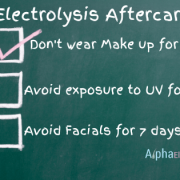Extra hair growth a problem?
If you notice some extra hair growth on your body in unexpected places not common for females, you might have hirsutism, pronounced (HUR-soot-iz-um).
Hirsutism, which is the growth of excessive hair and is known as female hirsutism, affects between 5 and 10 percent of all females. The percentage is even higher among women with polycystic ovary syndrome. However, women with Asian or African ancestry tend to experience hirsutism less often than women with European genealogy.
And if you suffer from this condition, you may experience an undesirable growth of hair in a male-like shape. This excessive or increased growth, which can be dark or coarse, grows on the face, back, and chest.
Females with mild hirsutism can see a significant amount of hair growth on their chin, upper lip, or sideburn area. The hair can also grow on the lower abdomen and around the nipples.
Women with advanced hirsutism can experience excessive hair growth on the upper abdomen, sternum, shoulders, and upper back. Although hirsutism often begins with puberty, the amount of hair growth differs from woman to woman.

Woman with flowing red hair.
What causes hirsutism
Extra hair growth generally develops because of excess male hormones in females. These androgenic hormones are predominantly testosterone.
But other medical problems can lead to extra hair growth, including genetics, hormones, as well as lifestyle. Some significant causes of hirsutism are:
Polycystic ovary syndrome. (PCOS) can result in extra hair growth, often starting with the onset of puberty. It can cause an imbalance of sex hormones, according to the Mayo Clinic. Over time, PCOS can lead to excess hair growth, irregular periods, obesity, infertility, and sometimes cysts on the ovaries.
Congenital adrenal hyperplasia. Women can inherit this condition which is identified by abnormal production of steroid hormones. These hormones, which are developed by your adrenal glands, can include cortisol and androgen,
Cushing syndrome. Excessive hair growth happens with exposure to high levels of the hormone cortisol. It can develop from your adrenal glands that produce too much cortisol or from medications such as prednisone over an extended time.
Medications. Some medications can lead to hirsutism. Medications include:
minoxidil (Minoxidil, Rogaine);
danazol, which treats women with endometriosis;
testosterone (Androgel, Testim);
dehydroepiandrosterone (DHEA).
Females can also experience excessive hair growth from topical products containing androgens. These topical products are through skin-to-skin contact.
Family genes and excess hair growth
Other factors, however, can lead to hirsutism. Among them are congenital adrenal hyperplasia and polycystic ovary syndrome, which females can inherit.
Females of Mediterranean, South Asian, and Middle Eastern backgrounds tend to experience more body hair with no clear-cut cause than other women.
Obesity is also a contributor. Excessive body fat can cause increased androgen production, which heightens hirsutism in some women.
Hirsutism treatment
Excessive hair growth in some women can cause a lot of emotional turmoil and can zap your confidence and undermine your self-esteem. Some women will feel self-conscious, and others will develop depression.
And although hirsutism is not preventable, it can be treated. Treatments include using medication, creams, waxing, plucking, shaving, depilation, bleaching, laser therapy, and electrolysis. And if you are overweight. Losing weight might help reduce hirsutism.
Laser Therapy
Many women suffering from excessive hair have turned to laser hair removal for help. Laser therapy can be a successful treatment option, but the hair can grow back. It is safe and effective.
Other treatments include:
Medication
Medication is also a treatment option for excessive hair growth. According to the Mayo Clinic, medication treatment can take up to six months, the lifespan of a hair follicle, before you see any significant results.
Medications include oral contraceptives and anti-androgens.
Topical Cream
Then there is also topical cream that your doctor can prescribe for excessive hair in women. The cream helps decrease new hair growth but does not get rid of existing hair.
Electrolysis
Electrolysis, a permanent hair removal option, is a popular option for getting rid of unwanted hair. And it has been around since the Civil War. This treatment involves inserting a tiny probe into each hair follicle and trigger a pulse of electric current to damage and destroy the follicle. You will need several treatments. There will be some pain, but a numbing skin cream can reduce any discomfort.
At Alpha Electrolysis, our trained nurse and electrolysis specialist treats men, women, and members of the transgender community who want to get rid of unwanted or excessive hair. Call us today for a free consultation.







